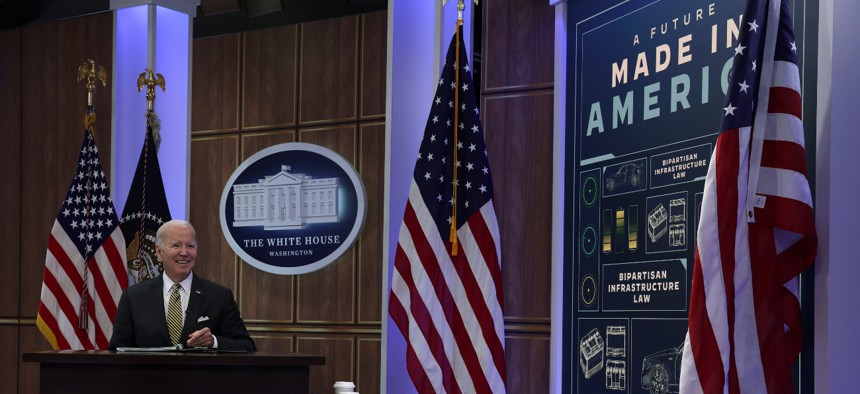
The new rule raises the domestic content threshold for federal procurements. Alex Wong/Getty Images
Biden's Push to Use Federal Spending to Support American Manufacturing Takes Effect
One OMB official says the new Made in America contracting rule is a “key part of the administration’s strategic approach to leveraging federal purchasing power to invest in American industry and all of America’s workers."
A final rule that seeks to use the federal government’s purchasing power to boost “Made in America,” took effect on Tuesday. It has been in the works since President Biden took office almost two years ago.
In March, the Biden administration issued a final rule, building on an earlier executive order, that updated the Buy American Act. Specifically, this rule raises the domestic content threshold for federal procurements, unless exceptions apply, from 55% to 60% this year and then to 65% in 2024, and 75% in 2029. The administration believes this will support American innovation, small and minority enterprises and create more good unions with good pay. The final rule’s effective date was delayed to give industry time to prepare.
“This increase in the domestic content threshold is a key part of the administration’s strategic approach to leveraging federal purchasing power to invest in American industry and all of America’s workers,” Livia Shmavonian, the new director of the Made in America Office, said in a statement provided to Government Executive. “We’re sending a clear signal to the business community to drive new investments, to create good-paying jobs, and to fill gaps in our supply chain – and it’s working.”
With the executive order, Biden established a Made in America office within the Office of Management and Budget, and Shmavonian was recently named its director.
Members of the law firm Holland Knight LLP pointed out that products made “predominantly of iron and steel” will still be “subject to the more stringent rule requiring less than 5% foreign iron and steel.” Additionally, “the final rule also does not affect the commercially available off-the-shelf exception, which waives the domestic content threshold for [commercially-of-the-shelf] items and only requires such items be manufactured in the United States.”
In addition to increasing the domestic content threshold, the final rule also established a “fall back threshold” to allow agencies to continue using the 55% domestic content threshold for
situations in which they have “determined that there are no end products or construction materials that meet the new domestic content threshold, or such products are of unreasonable cost,” said the rule’s text. This will be allowed until 2030. The final rule also creates a framework for giving higher price preferences to domestic products that are “considered a critical item or made up of critical components.” This will be addressed in a future rulemaking.
Biden’s initiative executive order on “Made in America” followed a similar final rule issued at the end of the Trump administration. The Biden administration has also pursued its Made in America goals through implementation of the bipartisan infrastructure package.
However, a potential roadblock could be that there are at almost 30 requested waivers to the “Build America, Buy America” requirements for the national network of electric vehicle charging stations, which are part of the bipartisan infrastructure law, as Roll Call reported on Sunday. The Alliance for American Manufacturing has been tracking this.
“Of the 28 proposed waivers published for public review and comment, 20 have been approved and eight are still pending review by OMB,” Elizabeth Brotherton Bunch, spokesperson for the association told Government Executive. “The majority of these waivers are time-limited ‘adjustment period’ waivers, delaying implementation for one year or less. In recent months, we have seen proposals for more enduring [Build America, Buy America] waivers, including [the Federal Highway Administration’s] proposed waiver of [the] requirements for EV chargers.”







